Reforming Economics Teaching – What do economics students think at the University of Zurich
Plurale Ökonomik Zürich has conducted a survey among economics students at the University of Zurich about their perception of reforming economics teaching. According to their survey economics students in Zurich would clearly welcome plural teaching combined with more time allocation to reflection and discussion in lectures and seminars. However, a broader collaboration is needed to gain more insights for the future of economics teaching.
Download the whole report in German here.
In brief
The survey “Reforming Economics Teaching” on current teaching and potential for improvement at the Department of Economics at the University of Zurich was answered by approximately 10 percent of the economics major students between February and March 2022.
- Students choose the subject because of economic policy interests and altruistic motives. They perceive an influence of the subject on the development of their political opinion. Studying economics is political – the question is how we deal with it.
- A clear majority of students welcome plural teaching. They want to get to know what they don’t know yet: Above all, they would like to learn more about ecological economics and post-growth approaches. Furthermore, all three concrete reform proposals received a high level of approval:
- 70 percent of the survey participants would welcome it, if the department or faculty itself would commit to plural teaching
- 75 percent of the participants agree that the assessment year should be fundamentally reformed and the focus should be placed on methodological, theoretical, historical-local and disciplinary contextualisation.80 percent would welcome it if more time would be allocated to discussions and theory comparisons.
- As a result of this survey, we hope to work in collaboration with other economics student associations and the Department:
- To conduct a shorter survey on a broader student base – Our survey is currently the only basis for an informed discussion.
- To initiate an open, informed and fundamental debate with all students and teachers about the future of economics teaching.
Background of the survey
The survey “Reforming Economics Teaching” on current teaching and potential for improvement at the Department of Economics at the University of Zurich was conducted by us, the student organisation Plurale Ökonomik Zürich at the beginning of 2022. With the survey, we focused on our core concern as a student organisation, the introduction of a plural teaching mode. Specifically, we asked students how they assess the economics degree programme and how they position themselves with regards to plural teaching.
We conducted the survey as an association from 24.02.2022 to 31.03.2022. It was sent by the Rectorate Service to all students (incl. doctoral students) who are studying economics as a major or minor subject at UZH. The Rectorate Services email thus reached 823 students. In addition, we, as an association, shared the survey link in our local chats, reaching almost 200 people.
Systematic differences emerged in some cases between those responses that were received in the chats, lectures, etc. before we made our indications and those responses that were received afterwards. In the evaluation, we therefore distinguish between the two groups:
- Group A (blue) consists of those who answered the survey before our additional mobilisation and thus only responded to the email from the Rectorate Service.
- For group B (purple), it is no longer possible to determine in individual cases whether the survey participation represents a reaction to the e-mail or to the aforementioned information.
Characteristics of the participants of the survey
A total of 87 people completed the survey, 77 of whom are majoring or minoring in economics at UZH and two of whom were former students of economics at UZH. The responses of the eight people who neither currently nor formerly studied at UZH are not included here in the evaluation of the survey. Based on the publicly available data on the detailed student numbers of 2018/2019, approximately 10 percent of the major students completed our survey and approximately 3.5 percent of the minor students.
The majority of respondents also stated that they were already aware of the debate on plural teaching. At the same time, only 20 survey participants attended the lecture series “Plural Economics”. (This took place in HS18 and HS19 as a freely selectable module. It was held again in HS21, when it was credited as a module in macroeconomics) Politically, most of the participants position themselves on the centre-left; in economic policy issues, they are more centrist.
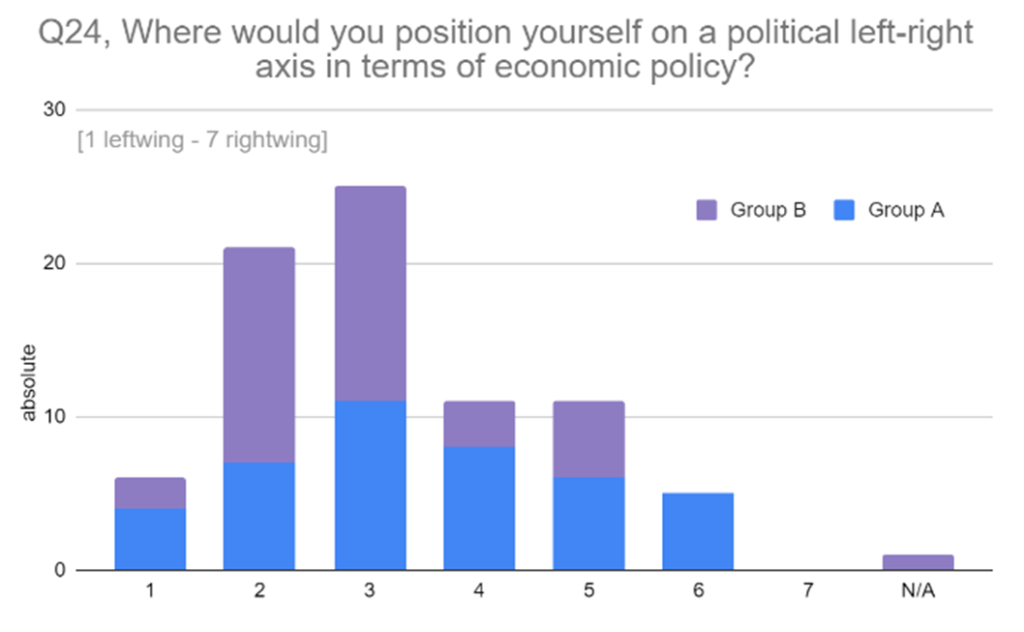
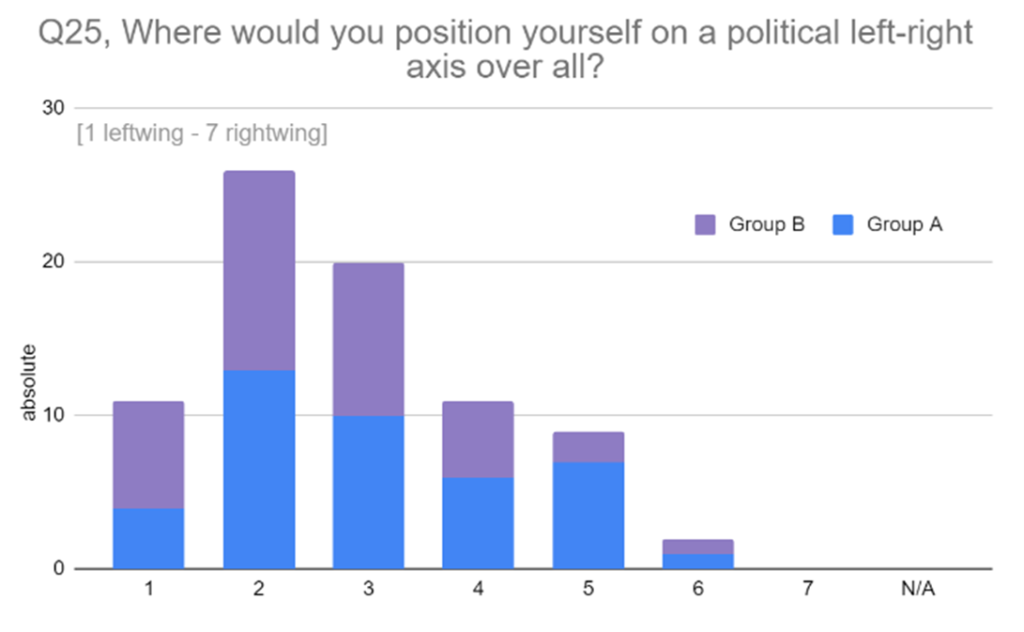
Motivation and influence of studying economics
Two of the three main reasons for studying economics are closely related to politics. This is not just a purely scientific interest in the interdependence between economics and politics. Contrary to some prejudice, economics students appear here as do-gooders. As the answers to open question 8 in particular imply, the majority do not want to work in the private sector after graduation (at least not in classic profit-oriented sectors). The term “development” in particular stands out among the answers.

On the other hand, becoming active in research and teaching does not appear to be the main motivation for studying economics, as question 7 shows – even if this does seem to be decisive for some of the students. The participants also rate the influence of their studies on their own political opinions as strong.
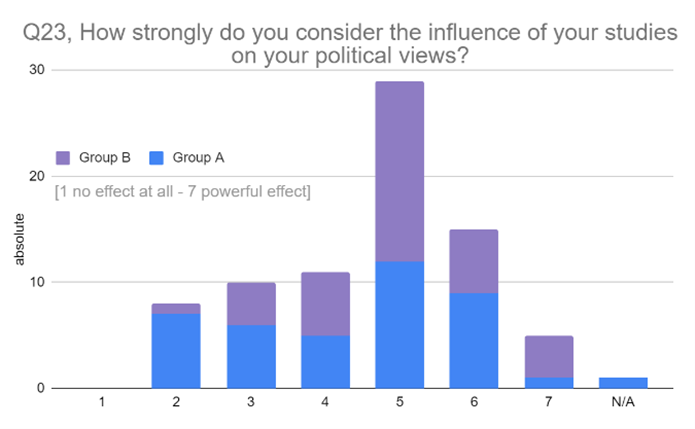
In summary, it can be said that for many, the study of economics is essentially a study of economic policy, with which the students also want to make a contribution to society – within and above all outside of academia. The question is therefore not, whether economics studies are or should be political, but how to deal with it.
Assessment of the status quo of the curricula
In contrast to the economic policy character of the economics studies discussed above, the teaching is hardly open to reflection, discussion, and for methodologically or theoretically interdisciplinary exchange. Question 9 offers a first insight into the economics studies at UZH. In questions 10 and 11, a clear majority state that the department leaves little room for discussion and reflection on the assumptions and implications of the models; or that the advantages and disadvantages of different paradigms are hardly discussed.
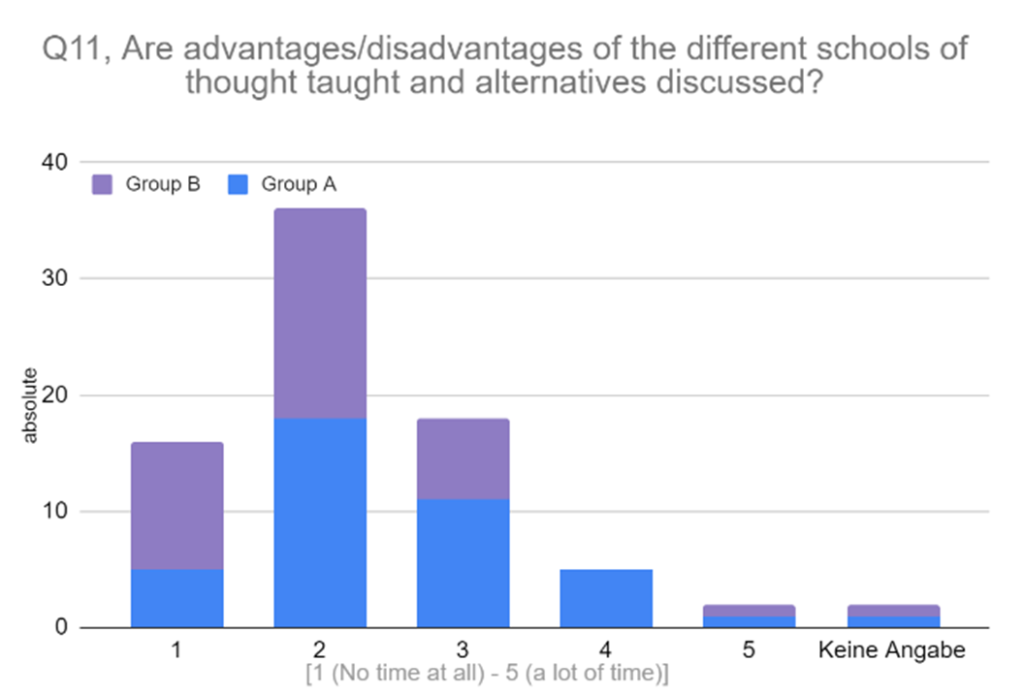
According to the answers to question 12, two of the eight methodological approaches are standard in teaching at UZH: regression/time series analyses and general equilibrium models. According to half of the participants, two others are taught at least in their basic features: experimental approaches and agent-based models. Methods beyond the neoclassical set of methods seem to be taught only sporadically and in their basic outlines – regardless of whether a corresponding methodological approach is widespread in all other social sciences or even belongs to the basic social science toolbox.
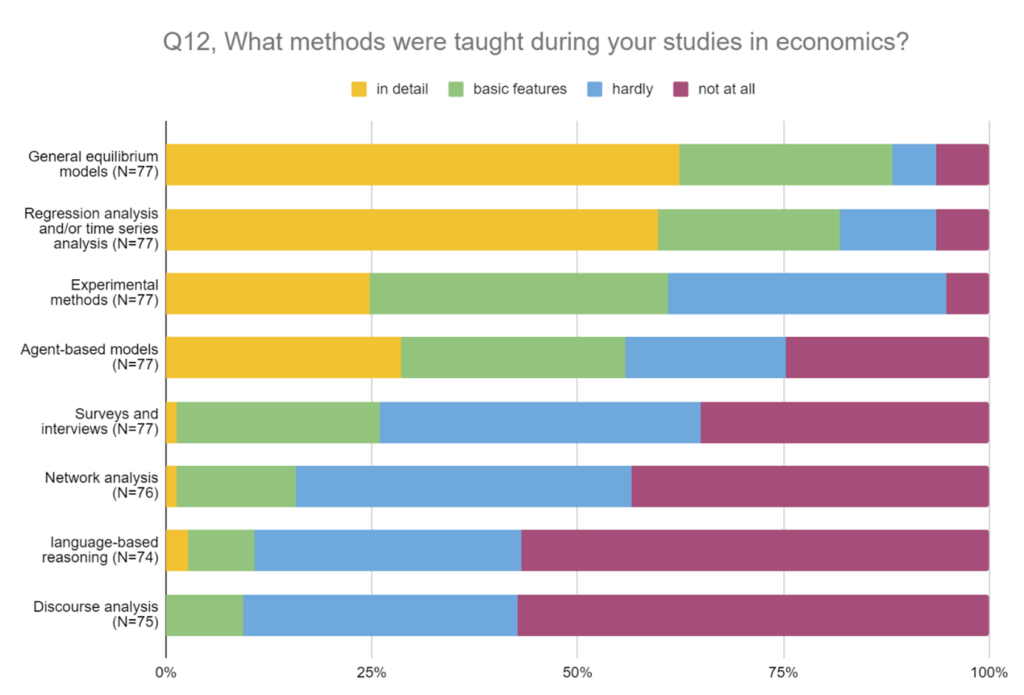
Irritating – at least at first glance – are the results of question 13 on the schools of thought known to the students. Both Marxist and Post-Keynesian economics received surprisingly high scores. At the same time, it is striking that approx. 15 percent, 40 percent and 85 percent of the respondents stated that they were not familiar with Neoclassical, New Keynesian and New Institutional Economics – even though these approaches are taught at UZH alongside Behavioural Economics.
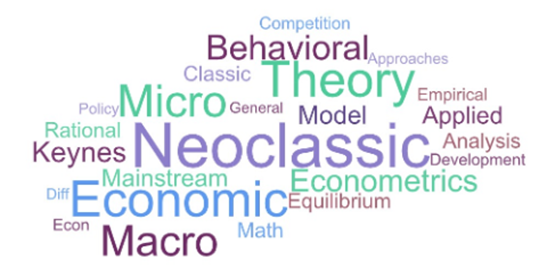
Potential Areas for improvement
For both groups of participants, it is evident that they would clearly welcome plural teaching in general as well as in the form of three concrete proposals. 70 percent of the participants clearly or tendentially welcomed plural teaching as well as the proposal that the department or WWF itself commit to plural teaching; 75 percent welcomed if the focus of the assessment year would be on a general overview and insight and 85 percent if more time would be allocated to discussions and theory comparisons.
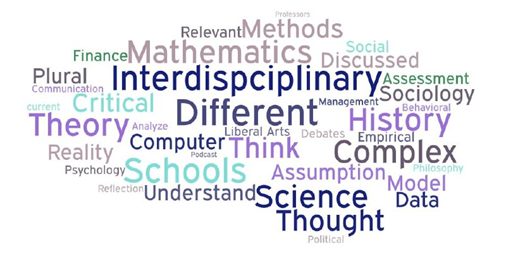
Last but not least, the answers to questions 20c and 22 indicate that students miss the real world connection of the theories taught and would like to see a stronger contextualisation of concrete economic phenomena.
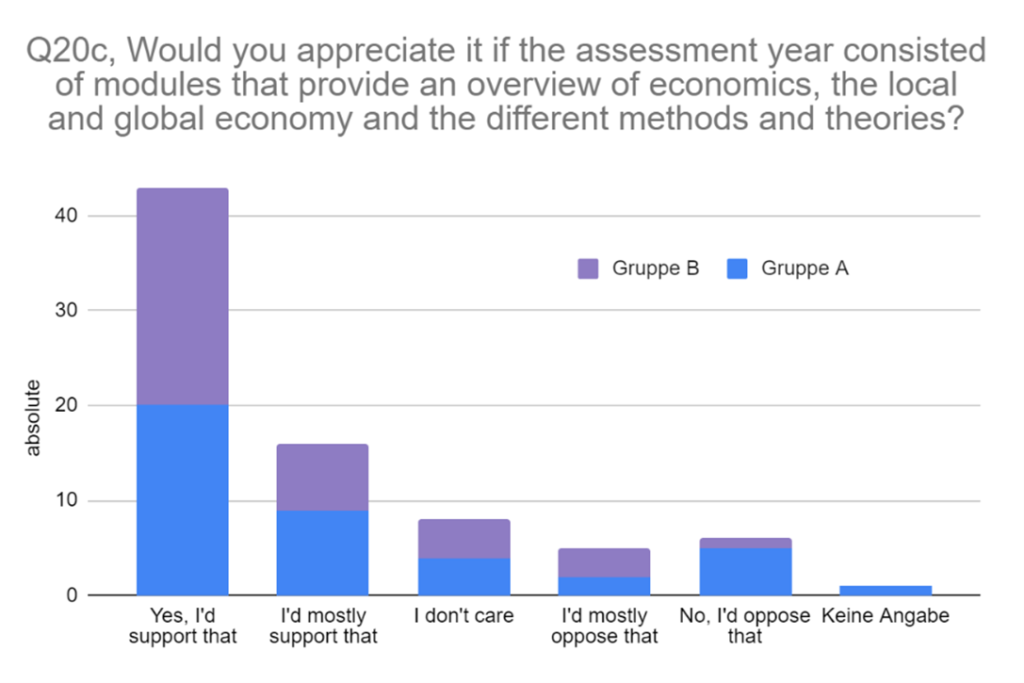
Conclusion
According to our survey economics students in Zurich would clearly welcome plural teaching combined with more time allocation to reflection and discussion. However, it is clear to us as an association and hopefully to all survey participants that the mode of teaching will not – and cannot – change fundamentally from one day to the next. But what is needed is a well-founded and informed discussion about the future of teaching in the economics department in collaboration with the students.
To that end we recommend reading “Economy Studies” (2021), which outlines an alternative curriculum in modular form.
Download the whole report in German here.
